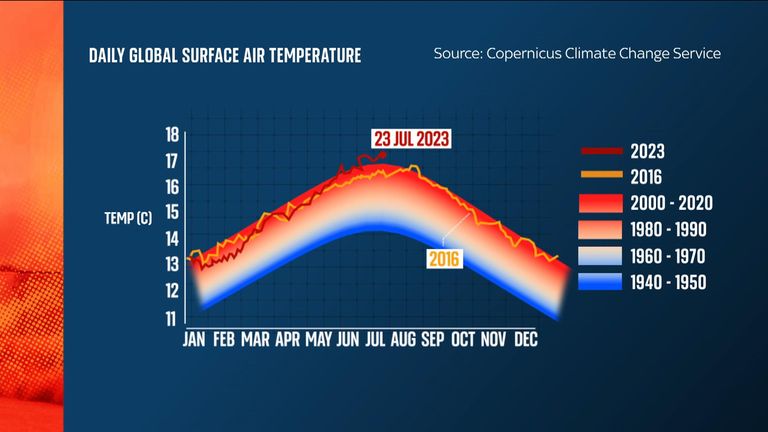Last year was the hottest on record, new data has confirmed, as scientists warn 2024 could be worse.
The EU’s Copernicus Climate Change Service today confirmed 2023 was indeed the warmest year since 1850 – a trend scientists were confident about before the year was out because it had been so exceptionally hot.
The global average air surface temperature in 2023 was 14.98C – beating the previous record set in 2016 “by a large margin” of 0.17C.
Copernicus found 2023 was on average 1.48C warmer than levels before industrial times, when humans began burning fossil fuels at scale.
Carlo Buontempo, director of Copernicus, called it a “dramatic testimony of how far we now are from the climate in which our civilisation developed”.
But Met Office scientists believe this record could be broken again very soon, with their forecasts suggesting 2024 could be even hotter, bringing more of the extreme weather suffered last year.
The smashed record last year is a sign the world is inching closer to reaching 1.5C of warming – the level countries agreed to aim for under the Paris Agreement, and after which point climate impacts become even harder to adapt to.
The world is currently expected to permanently breach the 1.5C target by 2030, even if the international community dramatically intensified efforts to cut emissions.
Previous reports had already blamed the rising heat for worsening fires in eastern Canada, drought in the Horn of Africa and intense rain and heatwaves in the UK.
For the UK, “flooding from greater storm intensity is the main impact from hotter temperatures to worry about”, said Professor Piers Forster, interim chair of the UK’s Climate Change Committee (CCC) and physical climate change professor.
The country is also “not immune to more severe impacts around the world, especially those that affect food supplies, migration, conflict, energy security and trade,” he said.
“We cannot let these impacts become the new normal, and nor do we have to,” he added.
“We can also limit future warming by acting urgently to reduce emissions. Global action to reduce coal use and limit methane emissions from fossil fuel and farming can immediately cut warming rates in half.”
Why was 2023 so hot?
The Met Office’s Professor Richard Betts said humans are rapidly heating the planet “by building up greenhouse gases in the atmosphere from fossil fuel burning and deforestation”.
Last year also saw a transition to a warming weather pattern called El Nino, when heat from the ocean, particularly the central-east equatorial Pacific, releases into the atmosphere.
His colleague Dr Nick Dunstone said: “We expect the strong El Nino in the Pacific to impact the global temperature through 2024. For this reason we are forecasting 2024 to be another record-breaking year, with the possibility of temporarily exceeding 1.5C for the first time.”
While instrument records only go back to 1850, tree rings, sediment cores from lakes and ice cores provide information about individual years going back 2,000 years into the past.
“We can be confident we haven’t seen a warmer year globally since the birth of Christ,” said Prof Forster.
Last year was record-breakingly warm in the oceans and polar regions, too.
Copernicus said Antarctic sea ice reached record lows for the time of year in eight of the 12 months, while global average sea surface temperatures reached record levels for the time of year from April until the end of the year.
The ‘good news’, solutions and a warning
Climate scientists said acting quickly would help curb further warming.
Dr Friederike Otto, senior lecturer in climate science at Imperial College London, said: “Every tenth of a degree matters.
“Even if we end up at 1.6C instead [of 1.5C], it will be so much better than giving up and not trying, and ending up close to 3C, which is where current policies would bring us to.”
Professor John Marsham, an expert in atmospheric science at Leeds University, said: “We desperately need to rapidly cut fossil fuel use and reach net zero to preserve the liveable climate that we all depend on.
“The good news is not only do the public support more action on climate, but that it is often win-win, e.g. UK renewables are both cheap and improve energy security.”
Ed Hawkins, professor of climate science at the University of Reading, said the “devastating extreme weather events of 2023 are a warning that such events will continue to get worse until we transition away from fossil fuels and reach net zero emissions”.
He added: “It’s a warning that we will continue to suffer the consequences of our inactions today for generations. A warning that we will regret not acting faster when the technologies to reduce emissions are so readily available.”

